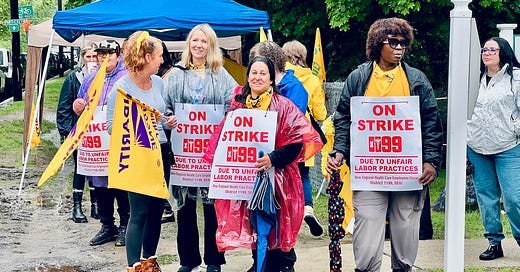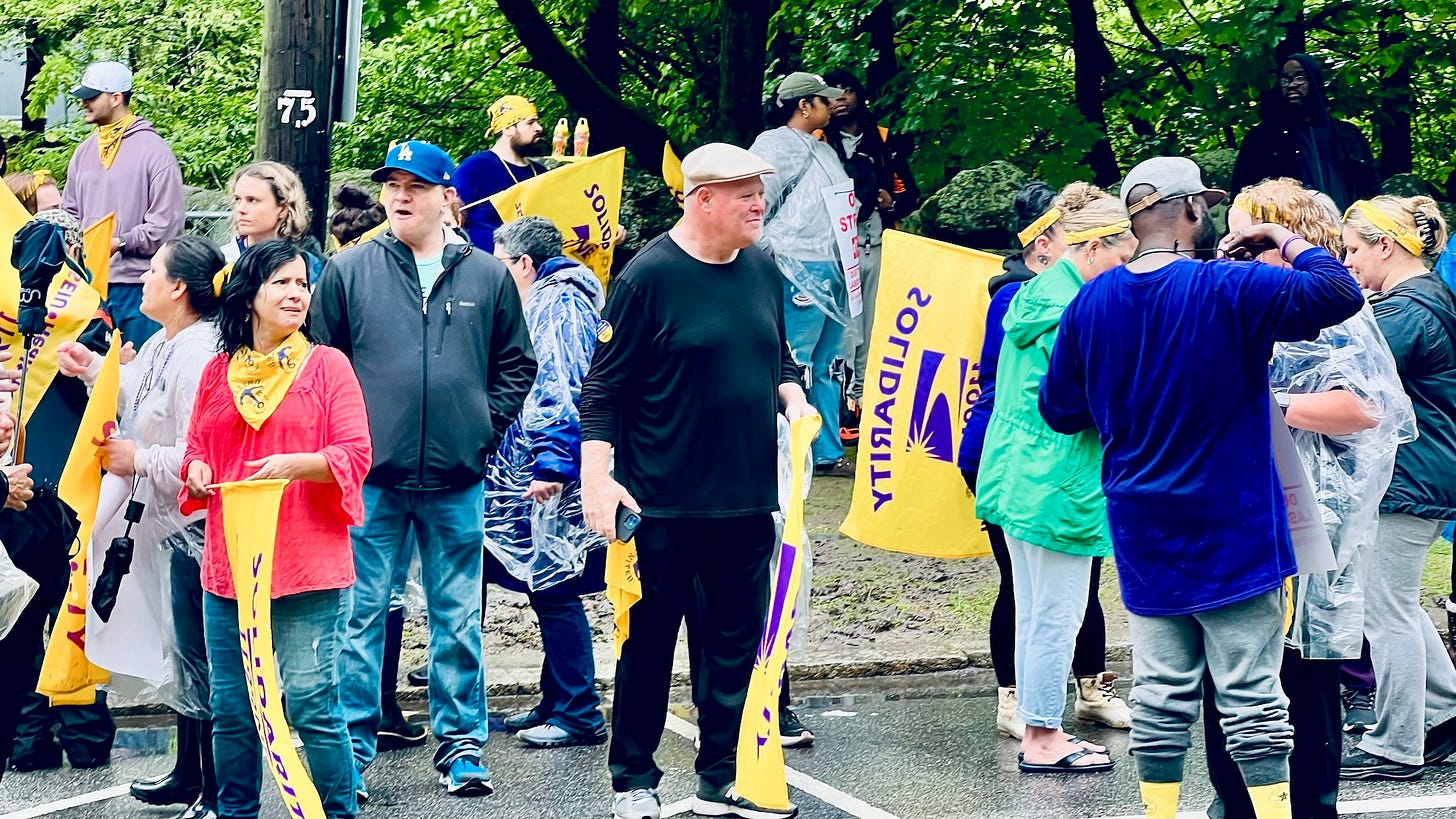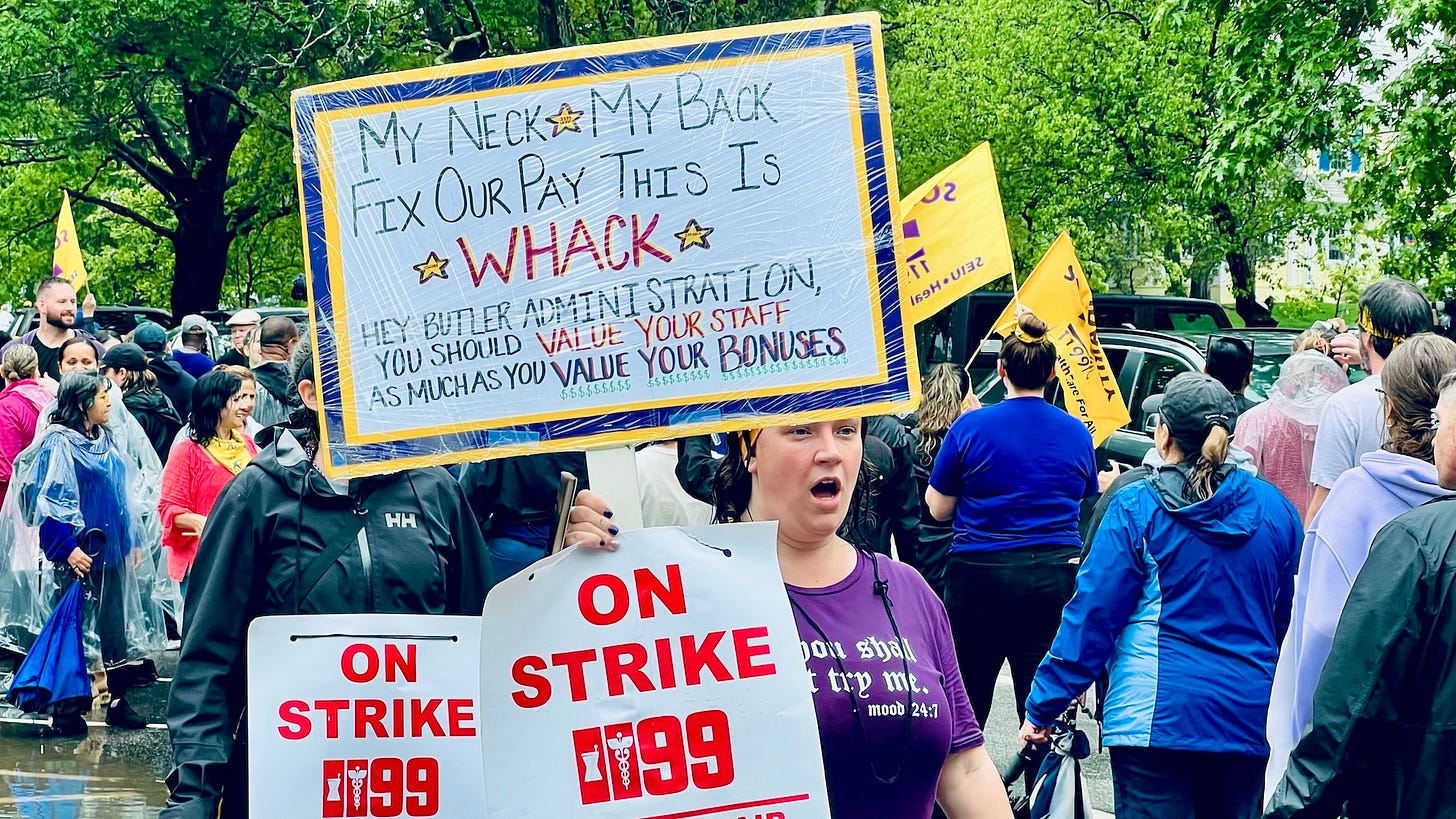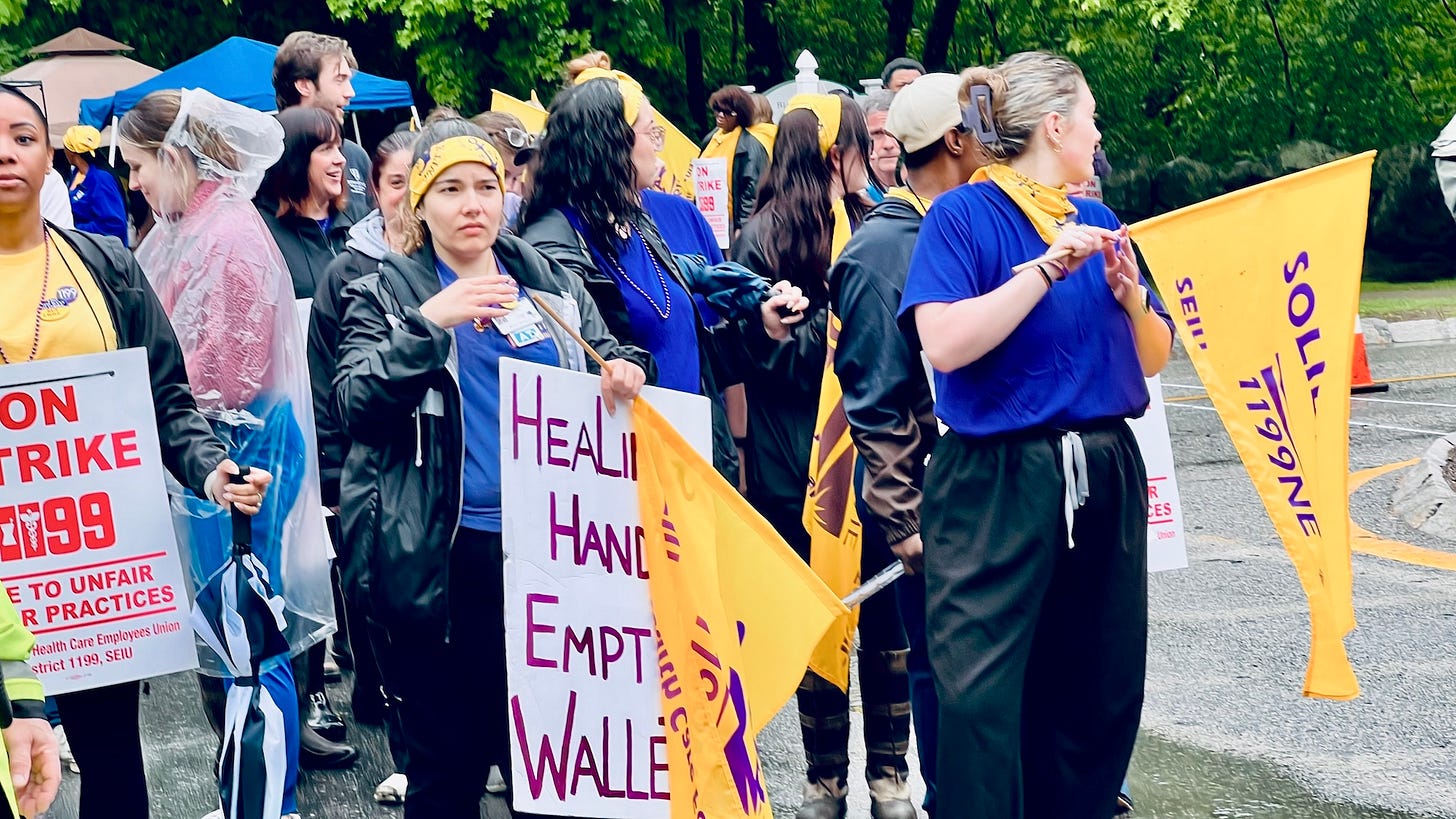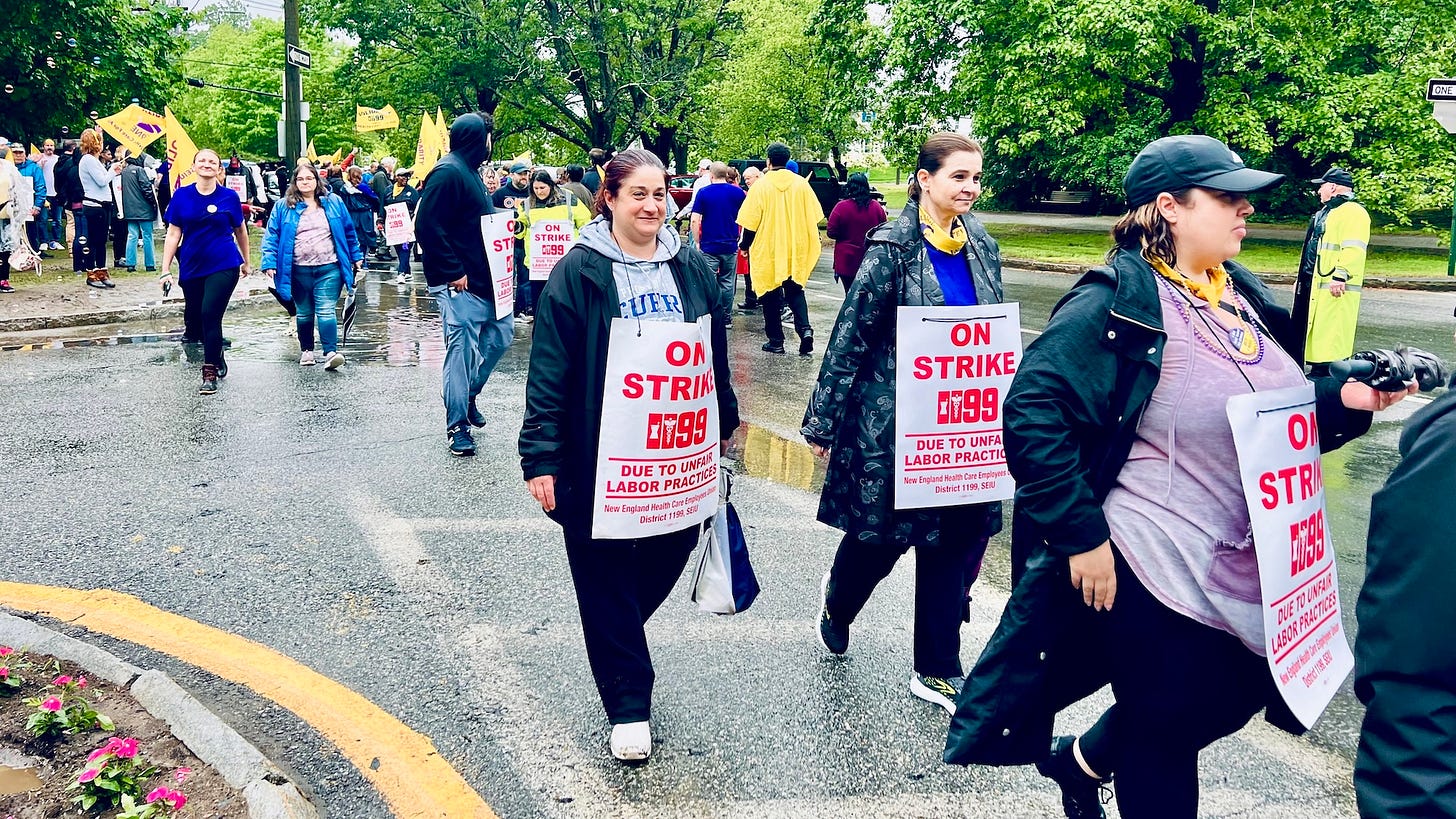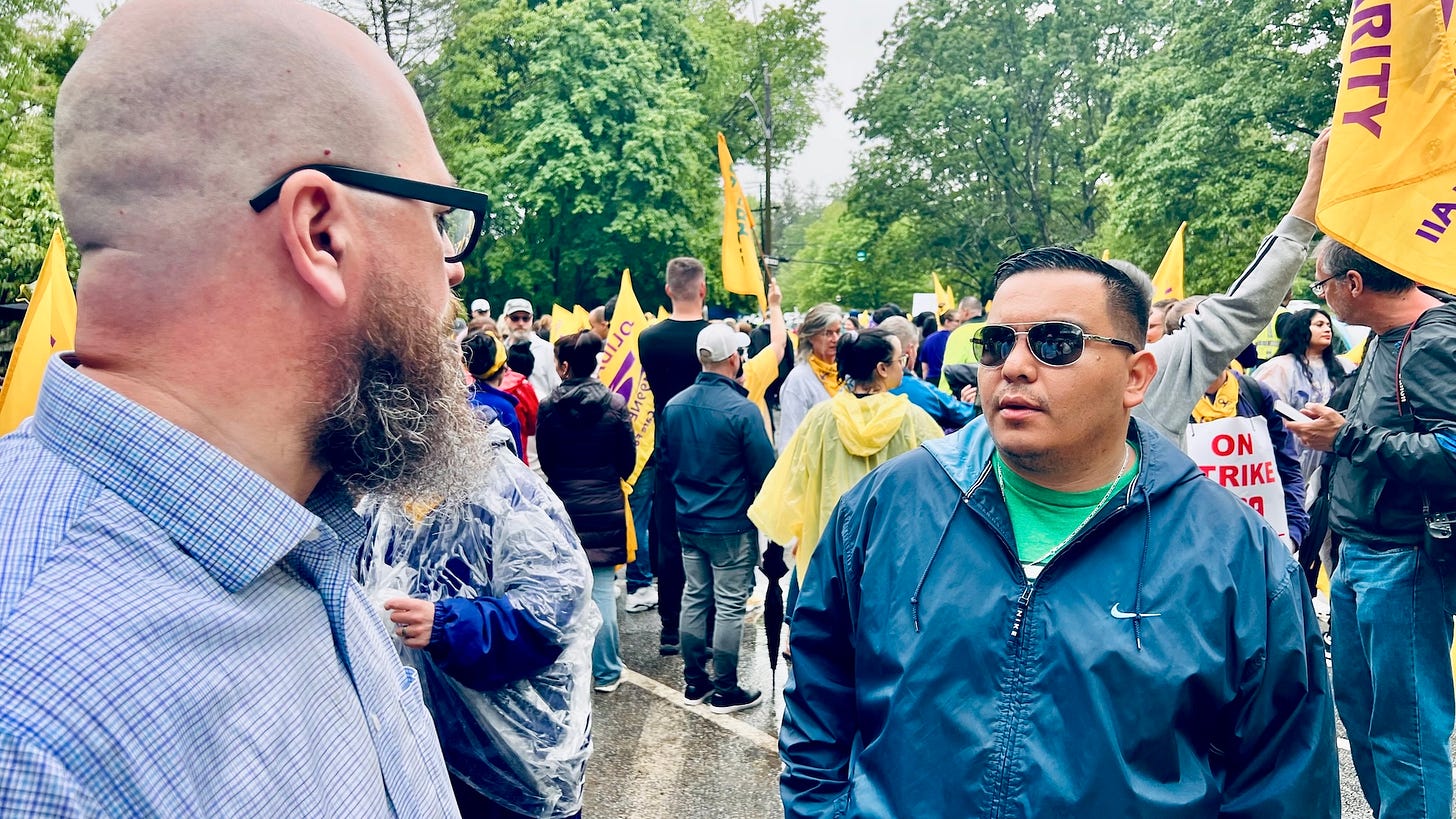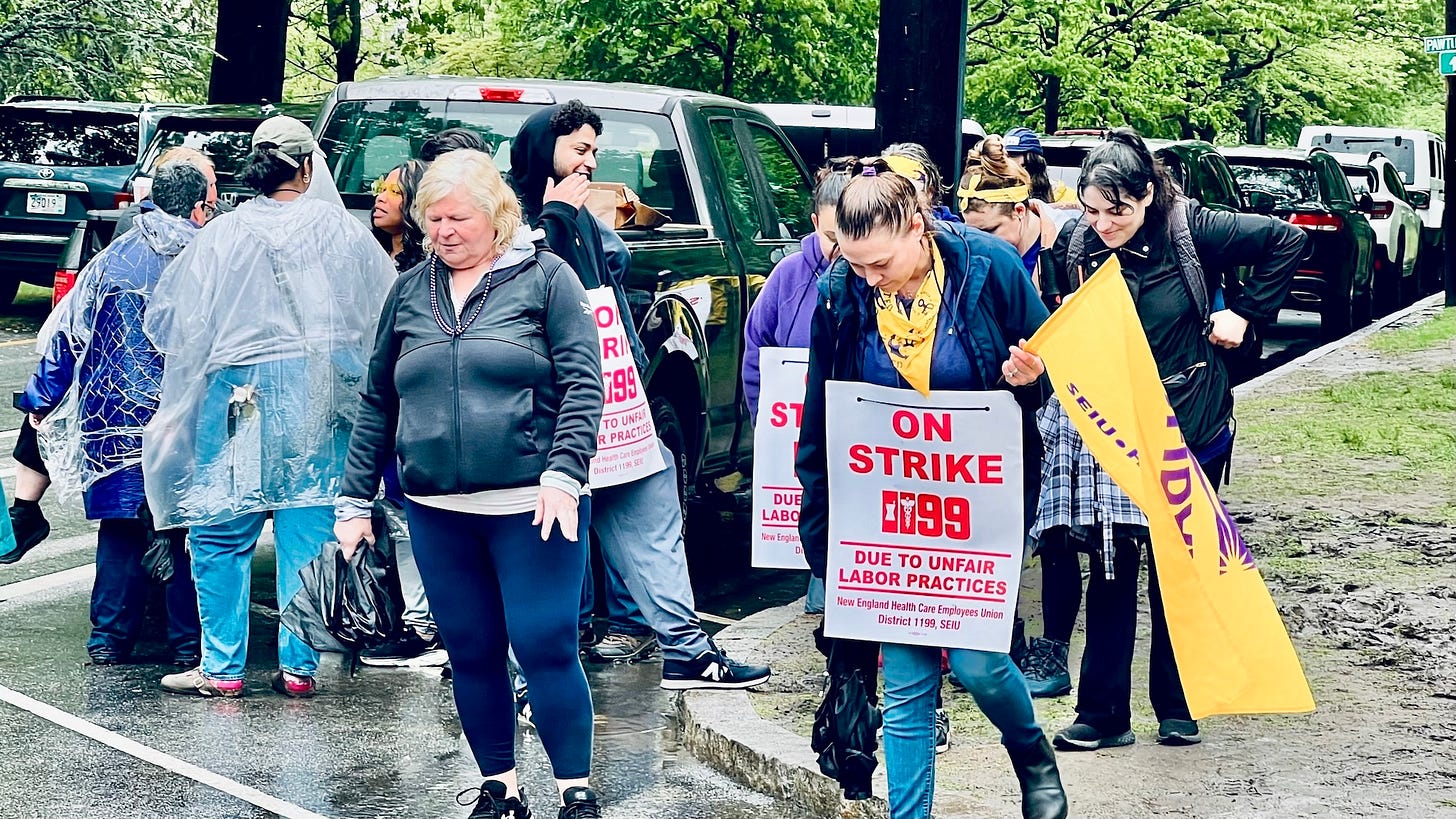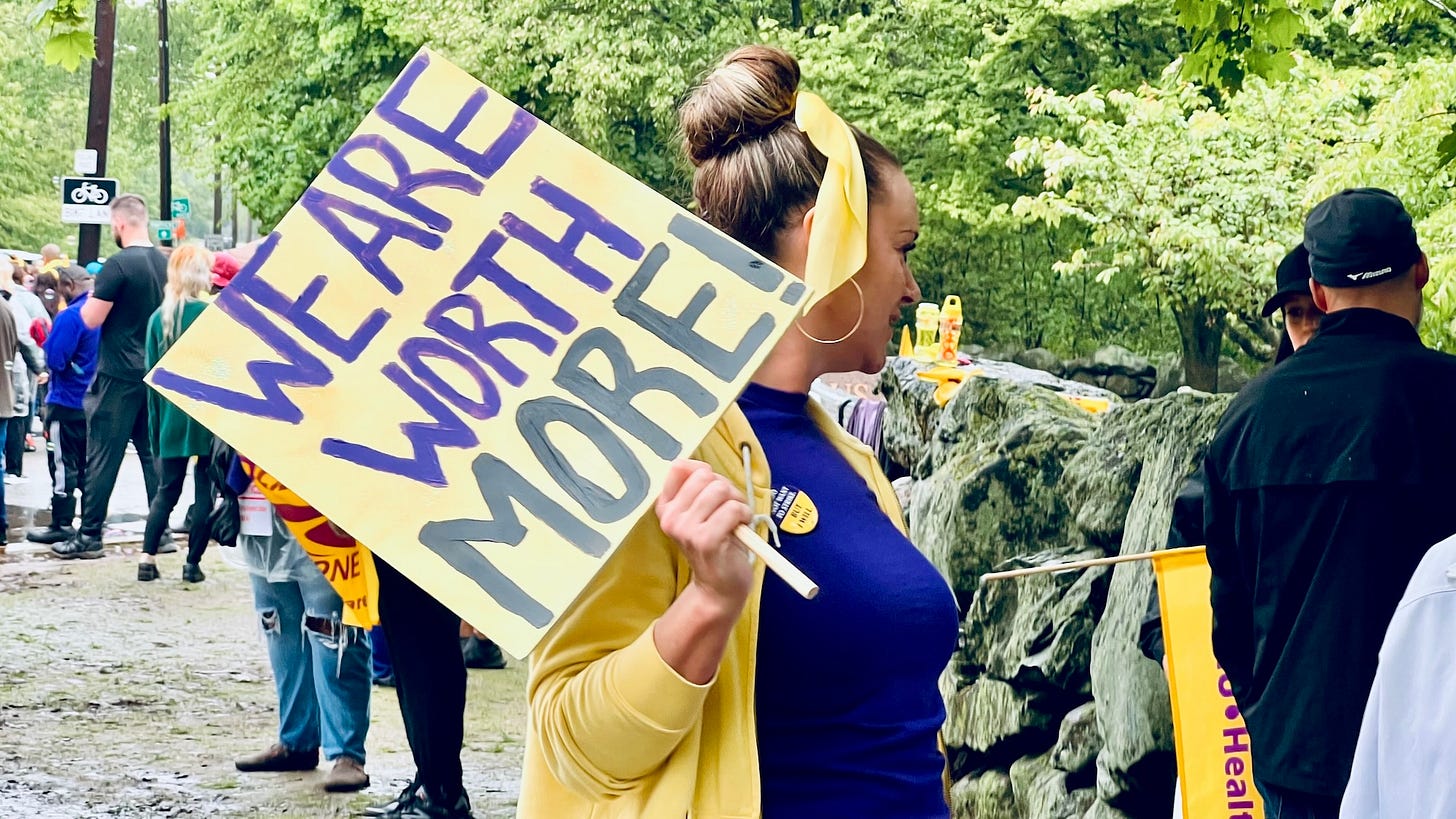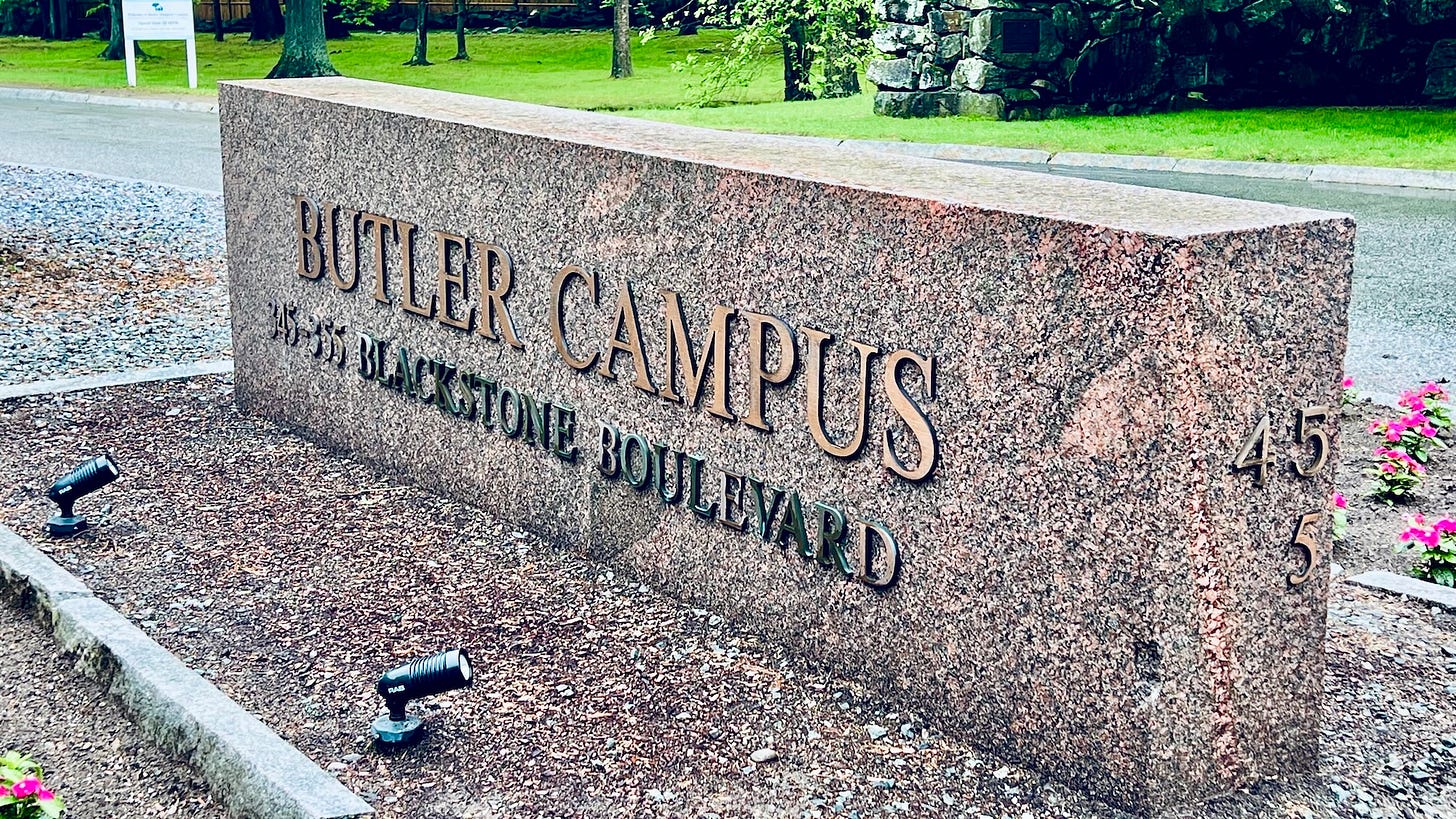Butler Hospital workers begin unfair labor practice strike
"We need our people to come out of poverty. We have people that are living in their cars. 60% of the folks that work here have said that they’ve had to choose between food and housing costs."
Frontline staff at Butler Hospital began their open-ended unfair labor practice strike for workplace safety and improved care after Care New England refused to consider the union’s most recent contract proposal to raise wages and address a growing workplace violence crisis. The strike began at 6 a.m. in the pouring rain. I spoke on the picket line with Butler workers Daniel Camp, K-Lee Butler, and Ashley Oullette.
Steve Ahlquist: What’s going on this morning?
Daniel Camp: We’re on strike. We’re a little wet, but spirits are high. We walked out this morning at 6 a.m. and handed over the hospital to those who would replace us. We did it safely. We ensured our patients were safe, and now we're out here—and we’ll be out here for as long as we need to get the hospital to realize it’s time to invest in us.
Steve Ahlquist: What is the status of the negotiations?
Ashley Ouellette: Last Wednesday at 8 p.m., we gave our last pass proposals, which was the last time we heard from the hospital.
Steve Ahlquist: They haven’t reached out since?
Ashley Ouellette: Not since.
Steve Ahlquist: That’s too bad. What were you looking for?
Ashley Ouellette: We need our people to come out of poverty. We have people that are living in their cars. 60% of the folks that work here have said that they’ve had to choose between food and housing costs. We need wages to get people up. We need retirement for when it’s time to be done working here.
The work we do, the folks who work here, the passion they have for these patients—nobody cares about these patients more than we do. All the people here deserve to retire when they're done. We also need to do something about workplace safety. Violence happens in every hospital. We’re constantly short-staffed, and something’s got to be done about it.
Steve Ahlquist: Can you tell me about the workplace violence?
K-Lee Butler: Due to the short staffing, many times, people are distracted, so they can't provide the quality care to the patients they need to.
Daniel Camp: It creates an unsafe environment. You will miss something when you do 800 things on the unit.
Steve Ahlquist: And you are dealing with people who are in bad states sometimes, serious situations.
Ashley Ouellette: People come here because they’re depressed or suicidal. It’s not like the movies.
I want the public to know that the patients are our neighbors. They are your teachers, lawyers, doctors, nurses, and police officers. All have gotten treatment here. They are people in the community, and to take care of them, we need experienced staff with the wisdom to care for the psychiatric population. You have to learn from experienced staff.
Steve Ahlquist: And right now, you have a high turnover rate.
K-Lee Butler: I work with people who have substance abuse issues. A lot of times, it’s not people who have depression, it’s people trying to get back on their feet due to a disease they have.
Steve Ahlquist: People at their lowest point, and you’re trying to bring them out of that. I have family who have been here, so I’m aware. I would like to know that the people doing that care are being adequately compensated and treated fairly.
Ashley Ouellette: This is supposed to be one of the best hospitals in the state. We’re a specialty hospital, so there is no reason for somebody to be living in poverty if they work here.
Steve Ahlquist: It was pouring out this morning, which is an inauspicious start, you might say. How are things now?
Ashley Ouellette: Great. We’re used to working as a team. We’re used to sticking together. Being out in the rain is not that difficult.
Steve Ahlquist: And it looks like the community’s been pretty positive. I hear a lot of honking horns.
Daniel Camp: We’ve always had each other’s backs. There have been times when I’ve had people come down from other units to help in dietary. I’ve seen it all.
We’re always there for each other.
Steve Ahlquist: That’s amazing. Is there anything else I should know?
Daniel Camp: We want to thank the community for all their support, even if it’s just coming by and honking. We’ve gotten a lot of support from the community.
Kathleen Gerard, who came by to support the workersand walk the line with them explained her support to me: “When I had a loved one who was getting care in a number of different facilities in Rhode Island - hospitals, assisted living, and dementia care - the best care that he received anywhere was at Butler. It was a month there, and it was the most genuine - I can’t think of any word other than loving - care and competent, smart, and comprehensive care he received from all the staff there. And I will always support the staff at Butler since that experience.”
SEIU 1199 New England represents over 800 frontline staff at Butler Hospital, including registered nurses, mental health workers, clerical, environmental service, and dietary staff who began bargaining in March. On April 25, 91% of the frontline staff at Butler Hospital, or 99% of workers who participated, voted to authorize the strike, citing management’s refusal to address their ongoing concerns with workplace safety and wages below market value. Patient assaults on workers that required medical attention have increased fourfold from 2021 to 2024, and there has been a 79% increase in overall workplace injuries in the same period. SEIU 1199NE’s negotiating committee submitted proposals as late as 8 p.m. on Wednesday, May 7, but hospital management has not responded.
Jesse Martin, Executive Vice President of SEIU 1199 New England, rallied the workers from the back of a truck with a bullhorn:
“Let me tell you something: Care New England has never seen anything like us today. The rain couldn’t stop us. The boss can’t stop us. No one can stop us. We’ve had over 300 members on this picket line since 6 am. Care New England spent $3.2 million today to try to break our union. Let me tell you something: They’ll never break our union because we do something magical at 1199. We stick together. It doesn’t matter what you do in this hospital; it doesn’t matter if you’re EVS, dietary, a nurse, a mental health worker, a social worker, in the call center, or PAS. It doesn’t matter what you do. We all do it together to make sure our patients are treated right.
“We deserve wage increases that lift our members out of poverty. To see that hospital CEOs make hundreds and hundreds of thousands of dollars off of our work, but our members can’t feed their families? That’s wrong. There was a time in this state and in this hospital when you could talk to your manager and have a relationship. No more. Corporate Care New England only cares about profit.
“Let’s be real. This fight is about not just Butler Hospital, but all healthcare workers in the state of Rhode Island. We’re holding the line to make sure that when workers make you profit, we deserve our fair share. We also make sure that we hold our elected officials accountable. We need a hospital and healthcare system that works for workers and patients, not corporate profit.
“Last Wednesday at 8 p.m., the union gave the hospital a proposal. The hospital refused to answer that proposal. Now, the hospital says the union won’t engage in negotiations. Guess what? They’ve got our damn phone number. Make a call.
“The hospital thinks that you deserve less than all other hospitals in this state. They want to put our retirement at risk. They want to make you pay more for healthcare. One part of their proposal that they didn’t talk about is that they want to prevent us from being able to bid on jobs for a whole year. When you take a new job, a new shift, or a new classification, they want to hold you in that old job for two months. We change our jobs and our hours so we can provide for our families. We do that when we get a higher level of licensure. Maybe a mental health worker wants to be a nurse someday, but under the hospital’s proposals, they couldn’t do it for a year. And even when they do do it, they have to make less pay for two months.
“Care New England also didn’t tell our members that they also want to cut a floating holiday. They didn’t put that in their summary; they only talked about being willing to give you double from the last contract. Guess what? That isn’t enough.
“We got a great contract last time. But the world turned upside down. Inflation went through the roof, and it’s not coming back down anytime soon. We deserve to be treated like every other healthcare worker in this state.
“I’m always asked, ‘Jesse, how long will this strike last?’ It’s going to last one day longer than Care New England. As long as we stick together, we are going to win.”
On May 12, the union filed unfair labor practices against the employer, identifying numerous categories of behavior by the hospital that are both unlawful and unacceptable to the union members, including,
Refusing to bargain in good faith;
Threatening, coercing, and retaliating against workers for protected union activity;
Surveilling workers as they engage in union activity; and,
Making unilateral changes to the conditions of employment after the contract expired.

